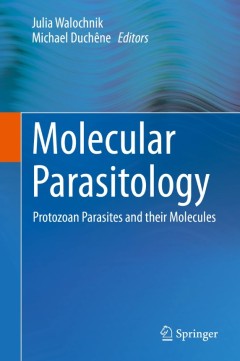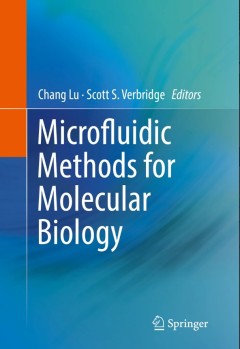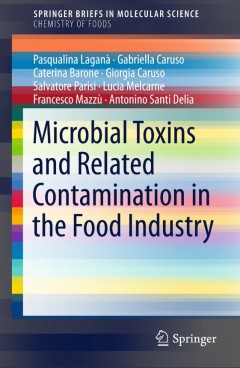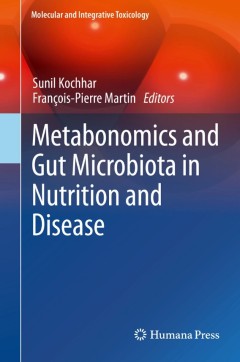Filter by

The Th2 Type Immune Response in Health and Disease From Host Defense and All…
The type 2 immune response that develops during infectious disease has undergone major paradigm shifts in the last several years as new cell types and pathways have been identified. It is now clear that the type 2 immune response, characterized by elevations in specific cytokines, including IL-4, IL-5 and IL-13, is associated with helminth infections in both humans and mice. This response is co…
- Edition
- -
- ISBN/ISSN
- 978-1-4939-2911-5
- Collation
- -
- Series Title
- -
- Call Number
- -

Molecular Parasitology
In the past years, genome projects for numerous human parasites have been completed and now allow first in depth comparisons and evolutionary conclusions. The genomes of parasites reflect the coevolution with their host, metabolic capacities depending on their respective habitat in the host. Gut parasites usually have an anaerobic metabolism, while blood parasites have an aerobic metabolism, in…
- Edition
- 1
- ISBN/ISSN
- 978-3-7091-1415-5
- Collation
- IX, 547
- Series Title
- -
- Call Number
- -

Microfluidic Methods for Molecular Biology
This book covers the state-of-the-art research on molecular biology assays and molecular techniques enabled or enhanced by microfluidic platforms. Topics covered include microfluidic methods for cellular separations and single cell studies, droplet-based approaches to study protein expression and forensics, and microfluidic in situ hybridization for RNA analysis. Key molecular biology studies u…
- Edition
- 1
- ISBN/ISSN
- 978-3-319-30017-7
- Collation
- XII, 376
- Series Title
- -
- Call Number
- -

Microbial Toxins and Related Contamination in the Food Industry
This Brief concerns the chemical risk in food products from the viewpoint of microbiology. The “Hazard Analysis and Critical Control Point” (HACCP) approach, which is applied for this purpose, is dedicated to the study and the analysis of all possible dangers by food consumptions and the related countermeasures with the aim of protecting the health of consumers. This difficult objective is …
- Edition
- -
- ISBN/ISSN
- 978-3-319-20558-8
- Collation
- VI, 101
- Series Title
- SpringerBriefs in Molecular Science
- Call Number
- -

Microbial Endocrinology: Interkingdom Signaling in Infectious Disease and Health
Prof. Mark Lyte, Ph.D., M.S., MT(ASCP) is a Professor in the Department of Veterinary Microbiology and Preventive Medicine, College of Veterinary Medicine, Iowa State University. Prof. Lyte conducted experiments in 1991 that subsequently led him shortly thereafter to propose and found the field of microbial endocrinology. In addition to having served on scientific review panels for the National…
- Edition
- 1
- ISBN/ISSN
- 978-3-319-20214-3
- Collation
- XIII, 374
- Series Title
- Advances in Experimental Medicine and Biology
- Call Number
- -

Metabonomics and Gut Microbiota in Nutrition and Disease
This book provides a comprehensive overview of metabonomics and gut microbiota research from molecular analysis to population-based global health considerations. The topics include the discussion of the applications in relation to metabonomics and gut microbiota in nutritional research, in health and disease and a review of future therapeutical, nutraceutical and clinical applications. It also …
- Edition
- 1
- ISBN/ISSN
- 978-1-4471-6538-5
- Collation
- XVI, 375
- Series Title
- Molecular and Integrative Toxicology
- Call Number
- -

Metabonomics and Gut Microbiota in Nutrition and Disease
This book provides a comprehensive overview of metabonomics and gut microbiota research from molecular analysis to population-based global health considerations. The topics include the discussion of the applications in relation to metabonomics and gut microbiota in nutritional research, in health and disease and a review of future therapeutical, nutraceutical and clinical applications. It also …
- Edition
- 1
- ISBN/ISSN
- 978-1-4471-6538-5
- Collation
- XVI, 375
- Series Title
- Molecular and Integrative Toxicology
- Call Number
- -
 Computer Science, Information & General Works
Computer Science, Information & General Works  Philosophy & Psychology
Philosophy & Psychology  Religion
Religion  Social Sciences
Social Sciences  Language
Language  Pure Science
Pure Science  Applied Sciences
Applied Sciences  Art & Recreation
Art & Recreation  Literature
Literature  History & Geography
History & Geography